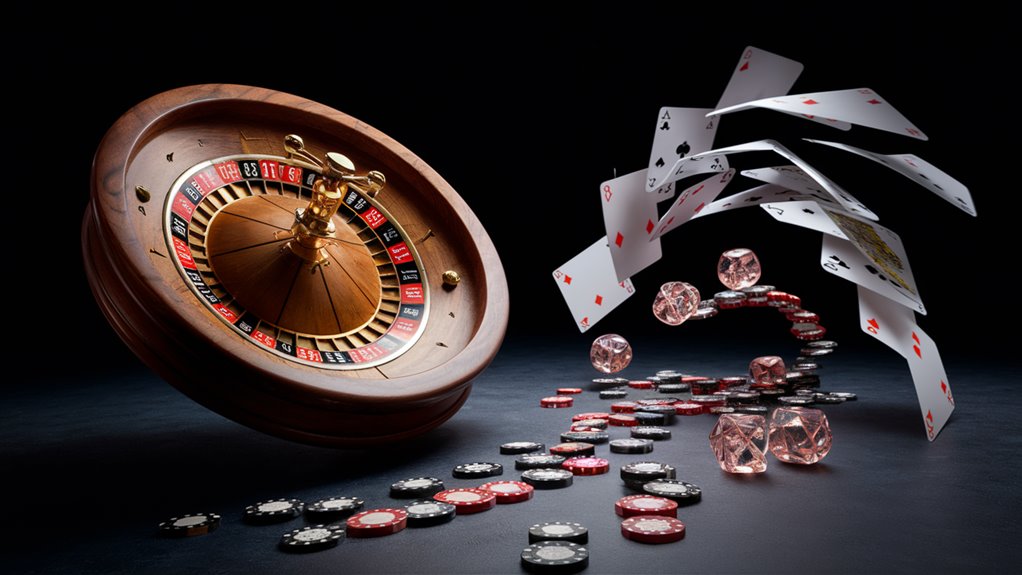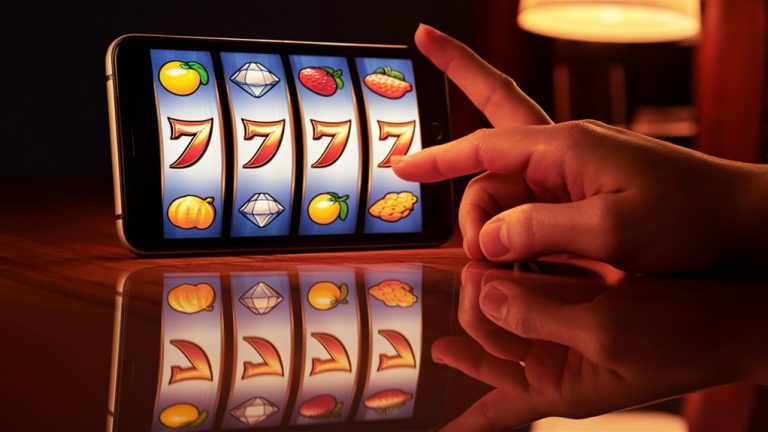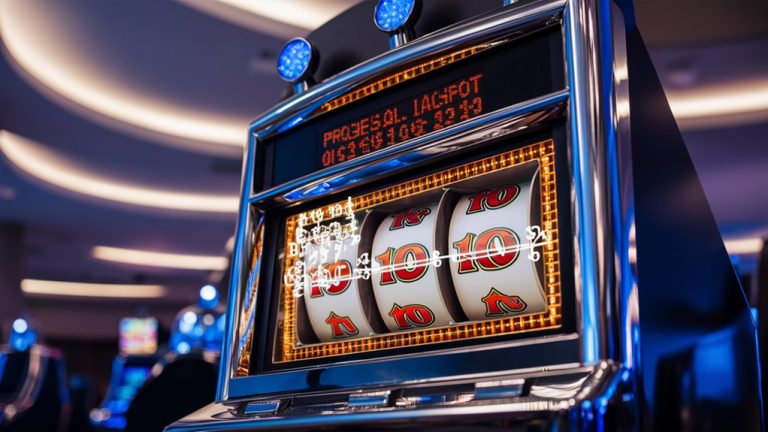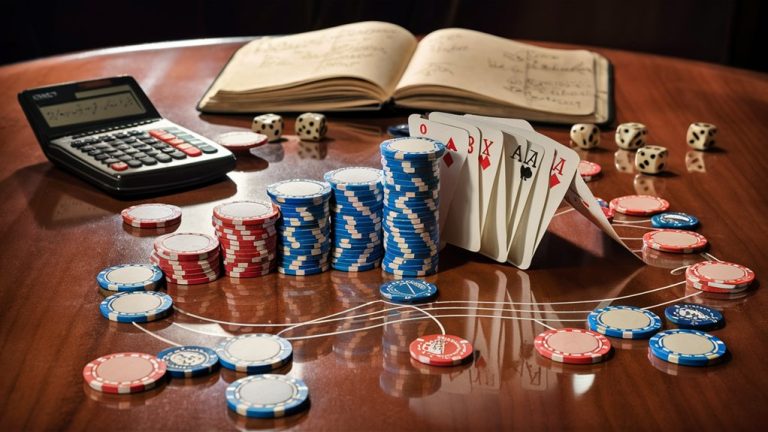
The Hidden Mathematics of Gambling Odds: An In-Depth Analysis
Mathematical Basics of Casino Play
Casino games are based on complex probability calculations and precise mathematical principles. This moderated insecurity ensures the house makes money whilst creating chance. The foundation of this software also explains how gambling results pan out in various games like blackjack or whether you’re using methods such as the Martingale method to win chips or not.
The Law of Large Numbers Reveals the Math of the House Edge
Through its single zero European wheel design, European roulette retains a precisely calculated 2.7% house edge. With an additional double zero (there are two 00 pockets on the wheel), American roulette’s house advantage jumps to an imposing 5.26%. You cannot afford mistakes in your calculations when betting on pinball, bingo card games for an overseas call centre or any kind of electronic games for prizes.
Modern Gaming Technology
Modern slot machines employ systems of complex Random Number Generator (RNG) algorithms that produce billions of entirely independent combinations. These advanced programs calculate and ensure accurately calibrated return-to-player (RTP) rates of around 85-98 percent. While keeping casinos profitable in this manner, they also make games interesting for players.
The Mathematics Of Betting Systems
Statistical analysis decisively shows that betting systems do not work against the casino. The law of large numbers as well as gamblers’ ruin mathematically proves that no matter how intelligent any betting strategy may be, in time a built-in house advantage will always win out over extended play periods. From table games and electronic gaming alike, this is the linchpin to all formats. Navigating Prickly Themes for Wild Bonus Blooms
Advanced Probability Analysis
Casino games are regulated in terms of their math by mathematical relationships far beyond simple odds calculations. Multi-variant analysis, anticipated value calculations, and complex probability matrices ensure that the game is always appropriately balanced to hold players’ attention while still being profitable for the casino.
Probability in Casino Games (The Long Side)
Understanding Casino House Edge Mathematics
Probabilities and Combinatorics in Card Game-
Blackjack probability is based on card removals and complicated combinatorics, and for all the other cards that remain in a standard deck. The probability of drawing an ace is 7.69% (4/52), face cards’ probability comes out to also be 30.77/52 which can adjust further depending on what happens later in the game.
Mathematical Distributions Used in Jackpot Winners
Selectors and generators, constants aggregate of game results, and slot machine results are affected by programmed payout levels like Return-to-Player (RTP) percentages. The expected value calculation of a machine with 95% RTP is a $5 loss per $100 wagered over an extended play period.
Probability calculations have been used due to the suit removal effect and card removal effect. Therefore it is possible to play strategically.
House Edge and Expected Value
In casino games, the importance of house edge and expected value may be seen in action. Merging Quiet Observations With Fiery End Moves
$100 bet on merely any number in European roulette satisfies this requirement in its most direct sense:
Win probability (1/50) × amount won ($3200) = $160
Probability of loss (49/50) × wager (-$100) = -$98
Total value: $62 (representing the house edge 1.24%)
House Edge Varies by Game
The overall house edge for different casino games is as follows:
In Blackjack, it is only 0.5% if you play by the book.
Baccarat offers players two options with an almost minimal house advantage; nevertheless, banker bet edges run up to about 1.06%.
Craps gives a mere 1.36% edge with any bet on the pass line or don’t pass line.
European roulette is 2.7% for a straight bet (35-1 payout), or single zero wheel which typically has higher probability than 5.26% American wheels.
At Keno the player loses an overwhelming 40 cents on the dollar!
Impact on Player Bankrolls
In each session, multiply total dollar value of stakes with the maximum house advantage to obtain total expected losses. E.g., $1,000 gambled at 5% (Worst Case scenario: -$50). $100 bet at 2% house edge, expect to win back on average $2 per game.
Mathematical Framework for Games
In the world of gaming, mathematics is widely regarded as essential for understanding what will happen in any given game, over large numbers of it.
Generating Random Numbers
How RNGs (Random Number Generators) work in casino gaming today.
Basic Building Blocks for Modern Games of Chance
Random Number Generators (RNGs) are the heart of modern gaming. They provide the necessary unpredictability to ensure fairness in all casino games, physical or digital.
These sophisticated electronic systems have just one function: to produce sequences of numbers that underlie the actual conclusion drawn from every roll at craps or hand-the totals on which blackjack hands are based in most cases. The mathematics of these algorithms is almost unfathomable!

How Casino RNGs Work
Pseudo-random number generation is what drives today’s casino games and their reliance on precisely engineered mathematical formulas. The linear congruential generator, using this formula: Xn+1 = (aXn + c) mod m creates sequences that appear to be random, but that are also computationally efficient as well.
As it is Implemented in Gaming Systems
Technological Basis for Gaming Systems Today. Modern slot machines use RNG systems with huge ranges, typically billions of permutations. Algorithms then convert the selected numbers directly into game results.
For a traditional 3-reel slot with 64 stops on each wheel, there are 262,144 possible combinations. That’s how complex and unfathomable modern gaming mathematics becomes.
Quality Assurance and Testing
Gaming regulators enforce stringent testing procedures for Random Number Generator systems, including:
Chi-square testing on distribution
Serial correlation testing in order to establish that the results are independent
Statistical randomness verification across lengthy sequences
All of these rigorous security measures ensure fair play and keep casino integrity intact in every game played by any kind of platform out there.
Digital Security
In order to prevent abuse and to make certain that it is consistently functioning in any playing situation, modern RNG configurations contain advanced security protocols. This technological infrastructure supports traditional casino operations as well as the growing online gaming industry.
Popular Game Odds
The Ultimate Guide to Casino Game Odds Calculation
Casino Mathematics Probability
Casino odds calculations necessitate meticulous mathematical analysis of different alternatives for each game. Combining Serene Growth With Sudden Risk Flashpoints
For Black Jack probability, the experts find the burst chance by systematically analyzing positive results over all possible results.
Roulette/Crap Probability Assessment
The 37-slot European wheel of Roulette shows us that odds are eventually heading to be 2.7% in favor of the house, while its American cousin (with 38 slots) gives an advantage for the same probability which equals 5.26%.
Modern Gaming Mathematics
Slot machine odds are determined through analyzing the payout/wager ratio across complete game cycles. The odds on a Video Poker game consist of Weighted virtual reel technology employed in contemporary slot design demands complex odds calculations based on symbol distribution patterns.
Poker hand probability follows the combination formula C(52,5), where the odds for each specific hand are determined against the 2,598,960 possible hands.
Advanced Probability Considerations
Casino game math requires knowledge of both theoretical and practical probability. To make successful odds calculations, you must look at:
Deck configuration variables
The result of showing cards
Several possible outcomes
The odds or inherent edge of the house
The Variance Factor in Statistics
Betting Systems Are Examined Statistically
Statistical Analysis of Betting Systems: A Comprehensive Guide
Understanding Expected Value and Probability Patterns
Statistical analysis of gambling systems shows that complex probability patterns with highly predictive and controllable properties can be identified by rigorous mathematical analysis.
Most betting systems show negative expected value (EV) after they have been used for some time in variance analysis; this eventually proves in line with the Law of Large Numbers.
Progressive Betting Systems
Progressive betting systems, especially the Martingale strategy, look effective in the short term but collapse like a house of cards thanks to principles of gambler’s ruin theory on their horizon.
Martingale: Starting with a bankroll of $1,000 making even-money bets, you can expect to be out of anything but debt over 95% probability in 500 trials. 안전놀이터
Advanced System Testing And Measures of Performance
Monte Carlo Simulations and Data Analysis
There are millions of comparisons in Monte Carlo simulations to test system reliability, Via static analysis. Statistical data shows that when positive progression systems are used, the standard deviation is typically 1.4 times higher than it would have been by flat betting.
The K%% Larry Kromax Pillar Of Wisdom: While mathematically optimal for bankroll growth, the Criterion demands an exact estimate of edge and line.
Regressing to the Mean: Regression analysis of historical betting data reveals that most systems experience a decline in win rate of about 2.3% per thousand bets as a result of variance and edge or house influence. This statistical downturn underscores how important it is for an evaluative assessment of betting systems to take place in terms that reflect the longer-term view.




